

Predatory Pricing and Amazon – Grasping for the Wind. The Authors Guild recently posted a blog entry called, “The Justice Department’s E-Book Proposal Needlessly Imperils Bookstores; How to Weigh In.”
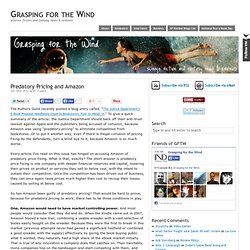
To give a quick summary of the article: the Justice Department should back off their anti-trust lawsuit against Apple and the publishers being accused of collusion, because Amazon was using “predatory pricing” to eliminate competition from bookstores. Or to put it another way, even if there is illegal collusion of pricing fixing by the defendants, turn a blind eye to it, because Amazon is so much worse.
Every article I’ve read on this issue has hinged on accusing Amazon of predatory price fixing. What is that, exactly? The short answer is predatory price fixing is one company with deeper financial reserves and capital, lowering their prices on product or services they sell to below cost, with the intent to outlast their competition. Amazon to blame for agency pricing: ABA. While the Australian Competition and Consumer Commission (ACCC) has said that it will look into any complaints from Australian retailers relating to the US Department of Justice's (DoJ) investigation into price collusion over ebooks, the Australian Booksellers Association (ABA) said that it would prefer the commission to look into Amazon's "predatory" pricing practices.
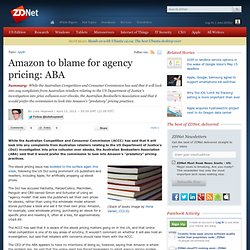
The ebook pricing issue has bubbled to the surface again this week, following the US DoJ suing prominent US publishers and resellers, including Apple, for artificially propping up ebook prices. The DoJ has accused Hachette, HarperCollins, Macmillan, Penguin and CBS-owned Simon and Schuster of using an "agency model" that sees the publishers set their own prices for ebooks, rather than using the wholesale model wherein stores purchase a book and sell it for their own price. DOJ e-books filing: Amazon probed, cleared for predatory pricing.
Authors Guild Sees Return of Predatory Pricing if DoJ Deal Stands. With the time to submit comments to the Department of Justice about its settlement with Hachette, HarperCollins and Simon & Schuster over its e-book pricing fixing case almost up, the Authors Guild filed its comments late Monday and minced no words in saying that the agreement would be a huge victory for Amazon. ”The Guild does not support the DOJ’s proposed e-book settlement.
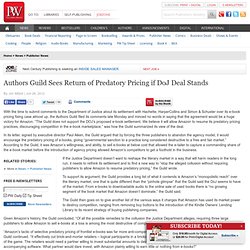
We believe it will allow Amazon to resume its predatory pricing practices, discouraging competition in the e-book marketplace,” was how the Guild summarized its view of the deal. In its letter, signed by executive director Paul Aiken, the Guild argued that by forcing the three publishers to abandon the agency model, it would encourage the predatory pricing of e-books, giving “governmental sanction to a practice long considered destructive to a free and fair market.”
The full text of the Guild letter is below. June 25, 2012 John R. Re: United States v. Dear Mr. Federal Trade Commission Bureau of Competition - Resource Guide to Business Competition. Can prices ever be "too low?
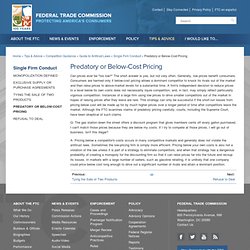
" The short answer is yes, but not very often. Generally, low prices benefit consumers. Consumers are harmed only if below-cost pricing allows a dominant competitor to knock its rivals out of the market and then raise prices to above-market levels for a substantial time. A firm's independent decision to reduce prices to a level below its own costs does not necessarily injure competition, and, in fact, may simply reflect particularly vigorous competition. Instances of a large firm using low prices to drive smaller competitors out of the market in hopes of raising prices after they leave are rare. Q: The gas station down the street offers a discount program that gives members cents off every gallon purchased. A: Pricing below a competitor's costs occurs in many competitive markets and generally does not violate the antitrust laws. What's the future of e-book pricing? In case you missed it, the U.S. government recently filed an antitrust lawsuit against Apple and five of this country's largest publishers, alleging they conspired to limit competition for the pricing of e-books.
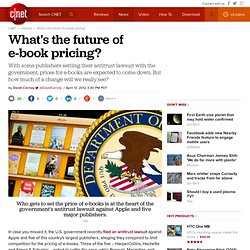
Three of the five -- HarperCollins, Hachette and Simon & Schuster -- opted to settle the case, while Penguin, Macmillan, and Apple didn't. So where does that leave us? Well, if you've spent any time reading through the terms of the settlement, you quickly realize not everything's all that black and white and is in fact quite muddled. For starters, a judge has to actually approve the settlement and then the three companies that have settled have to unwind themselves from their current contracts with retailers. All this should take a few months. New terms HarperCollins, Hachette, and Simon & Schuster, which is owned by CBS, the parent company of CNET, will have a couple of pricing models to choose from.
What will change? What won't change? Why e-books cost so much. Here's something that tends to get lost in the debate over e-book prices : Paper doesn't cost very much.
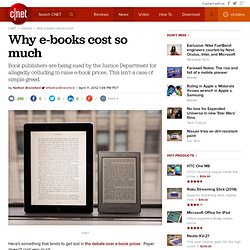
There's a perception among consumers that an e-book should cost very little or next to nothing because there is no paper, printing, and shipping involved.